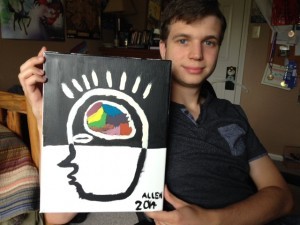A Day with the great Eustacia Cutler!
Note: This was one of our most popular posts and we thought it worthwhile to share again…
Occasionally in life, if you are lucky, you brush alongside greatness. Not celebrity, but greatness. A person truly inspired to invent, revolutionize, and create with the added momentum to actually implement their gift toward worldwide betterment.
I was blessed to have been afforded many hours with such greatness.
Eustacia Cutler was born into a privilege that most only have viewed actress Grace Kelly portray on film. Her book, A Thorn in My Pocket, depicts her life in a nostalgia that few today can even begin to imagine. Her Cotillion, the Dedham Polo Club, times at the Vineyard, life at Cambridge, Harvard, and stories of shared company of notables such as Winston Churchill, George Gershwin and Robert Frost. Talk more with Eustacia, and you will learn of her father’s invention revolutionizing flight. However, all of this is not the sum of the greatness of Ms Cutler. You’ve heard the statement not everything that glitters is gold? You see, Eustacia was married and had 4 children, one of whom had Autism.
In the 50s the pressure to institutionalize such a child came from doctors and family members. But when the pressure came from her husband, she went completely against the grain for the sake of her child, Temple.
Yes, as most of you know Eustacia Cutler is the mother of Dr. Temple Grandin. Dr. Grandin who went on to revolutionize the cattle industry as well as turn the world’s perception of Autism on its ear. Most of this information you probably already know, but the part you do not know is the day I was afforded time alongside Eustacia Cutler.
The 23rd Annual Texas Autism Conference was held in Corpus Christi this past week, and Sam and I had been asked to speak at one of the break-out sessions. The keynote speaker was Eustacia Cutler, who at the age of 88 offered such valuable and insightful information to the thirsty crowd of educators, parents and professionals, they were brought to their feet more than once. Her clarity, concern and connection with all in the room (primarily the mothers) intrigued my autistic son, Sam who was one of 4 to jump at the chance when the offer came to come up to the podium alongside her for a personal Q & A. When Sam (one of very few males in attendance) approached her and announced his name, and that he had Aspergers Syndrome the applause resonated with acceptance. Sam poised the question if Ms. Cutler was familiar with Moore’s Law which states that technology will grow at an exponential rate and if so, how does she perceive it will affect people with aspergers? Without missing a beat and looking my son straight in the eye she stated we, as humans, have a challenge ahead of us. Technology is essential, but perhaps Sam could be a forerunner bearing the seemingly impossible task of keeping the human factor within the technology field.
Her mind ever-sharp and in the moment allowed for many ‘ahh’ moments to walk away with. Here are just a few:
A graduate of Abilene Christian University, Jennifer had a long career in TV Broadcasting. Upon learning her oldest son Sam had a form of Autism called Asperger’s Syndrome, she left her career and became a full-time mother to both of her sons. Jennifer elicited the participation of her family and together they produced several independent programs including a children’s animated series titled Ameriquest Kids, as well as a documentary and book titled, Coping to Excelling: Solutions for School-age Children Diagnosed with High-Functioning Autism or Aspergers Syndrome. She formed the nonprofit Asperger101 to provide on-going free resources related to ASD at Aspergers101.com and has implemented the Texas Driving with Disability Program and continues to grow the statewide initiative today. She and her husband have recently retired to their property in the Texas Hill Country.










